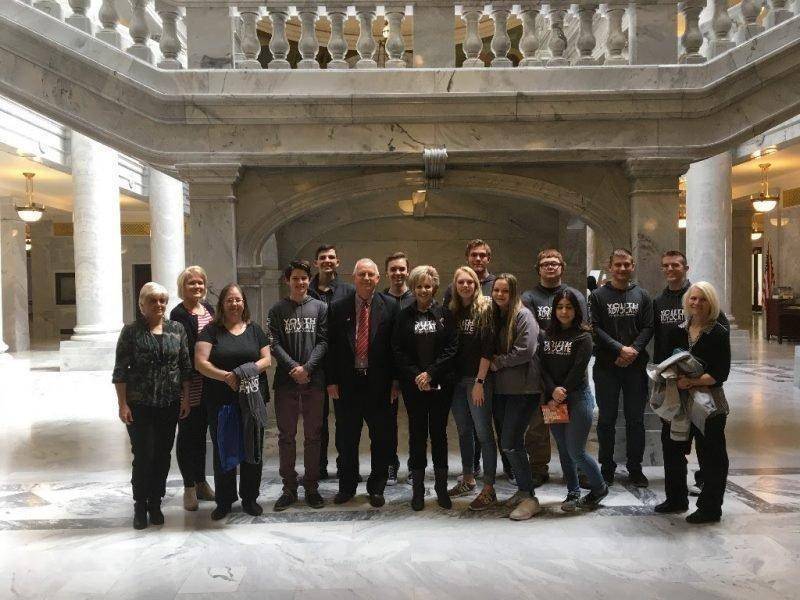Students from Sanpete, Wayne and Sevier counties visited Carl Albrecht at the Capitol last week.
Report from Representative Carl Albrecht, District 70
Visitors
Romney
Last week the Legislature expressed appreciation for Senator Hatch, which was shortly followed by an announcement to run for the opening by former Massachusetts Governor, Mitt Romney. Romney came to the State Capitol and spoke with those in the Majority Caucus. He has been traveling around the state and commented on the differing cultures found in the state between the Wasatch front and the Rural areas. Romney believes that his relationship with the President has become an honest one where they both respect each other because they are not afraid to call each other out. Romney also commented on protecting Local Antiquities and expressed that the power to create monuments ought to begin with local entities, who should also be involved in every step of the process.
Youth Coalition
On Wednesday I was visited by High-School students from Sanpete, Wayne, and Sevier hosted by their Local Health Department. These students were learning the power of their voices to some legislation this year. They spoke with me about some of his legislative efforts that might be affecting them, such as the Rural Jobs Incentives bill which passed the House floor this week and will be heard in Senate Committee on Friday morning.
Legislative Update
” On Monday H.J.R. 1 – Urging Congress to Exempt Utah from the Antiquities Act – was presented in Senate Natural Resources Committee. It passed despite some opposing public comment.
” Tuesday I presented H.B. 390 – Rural Economic Development Incentives (Rural Jobs Bill) – on the House floor. It passed and was presented on Friday in Senate Economic Development and Workforce Services Committee. A great thanks to the Commissioners, Superintendents, and other local leaders from Rural Utah who spoke in favor of the bill. It passed Unanimously and will go through the Senate next week.
” I have been very instrumental in securing enhanced funding for Snow College this session. I have worked closely with the higher education chairs in both the House and Senate.
Additional Info:
Public Lands
House and Senate members, Republicans and Democrats alike, are all on the same page when it comes to calling on the federal government to honor the promises made to Utahns.
The Federal Land Policy and Management Act (FLPMA) of 1976 allows the federal government to hold our public lands under federal control in perpetuity. This was a major policy shift. With nearly 70 percent of our land owned and controlled by the federal government, many communities, especially in rural areas, are deprived of tax revenue to fund schools and other essential government services. Recognizing the substantial burden placed on local governments and communities without the ability to levy property taxes, Congress established the Payment In Lieu of Taxes (PILT) program as a substitute for that lost revenue.
“In lieu” is defined as a substitute of equal value; however, by any objective measure, federal PILT payments to Utah for federal lands are nowhere near the tax revenue the state and local communities would otherwise generate. PILT is often referred to as pennies in lieu of taxes. Two months of state property tax on less than 30 percent of our land is the equivalent of about twenty years of PILT payments on 67 percent of our land.
HCR 19
Regarding the Impact of Federal Lands on the State Education System, urges Congress to pass legislation requiring “PILT payments to be a fair and steady source of revenue.”
Voice of the People
HJR 18, Special Sessions of the Legislature, is an amendment to the Utah Constitution that would allow the legislative body to call itself into special session under specific, very limited circumstances. These amendments would not take power away from the executive branch, nor remove the governor’s ability to call a special session.
The resolution would give the legislative branch the ability to convene a session if two-thirds of all members of the House and Senate determine that it is necessary due to a persistent fiscal crisis, war, natural disaster or emergency in the affairs of the state. The special session could not exceed 10 days and would not permit lawmakers to appropriate more than 1 percent of total expenditures of the completed fiscal year.
Currently, 35 state legislatures are able to call themselves into a special session to do the work of the people. The House Rules Committee unanimously passed the joint resolution on February 26. If it passes the Legislature, a constitutional amendment would be on the ballot in November. Track this bill on le.utah.gov.
Opioids
For years, pharmaceutical manufacturers systematically engaged in deceptive marketing practices to advance the sale of prescription opioids, downplaying the negative and addictive effects of their use. This behavior occurred as the North American prescription opioid market grew to a value of $12.4 billion at the cost, according to the Centers for Disease Control, of 91 American lives each day. Sixteen states have already filed suit against opioid manufacturers, seeking damages for the public cost of the crisis, and Cache, Davis, Salt Lake, Utah, Washington and Weber counties plan to do so as well. A joint resolution, HJR 12, which calls upon the Attorney General to immediately and publicly do the same, passed the House 72-0. Track the bill or any other bill at le.utah.gov.
As always, I am honored for the opportunity to represent you. Please contact me at carlalbrecht@le.utah.gov, (435)-979-6578 or my intern atafaddis@gmail.com, 385-441-0589. Please text, call, or email me with your concerns.

